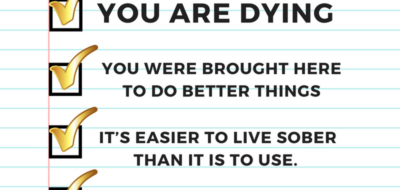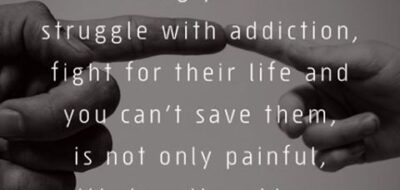Whether you’re a newly sober addict, alcoholic, or the family member of one, one thing’s for sure. If you’re going to stay healthy, you’ll need to work a program of recovery.
The addict/alcoholic’s main goal in early recovery is to stay abstinent. While the codependent’s is learning how to say no and set healthy boundaries.
For the codependent it’s easy to slip into ‘as long as the addict isn’t using, I’m fine.’
The addict/alcoholic can fall into the same trap, believing that abstinence is all that’s required of sobriety.
Both are wrong.
Sobriety and recovering from addiction, is a physical, emotional, behavioural and spiritual experience.
Without a group of people to hold you accountable, it’s easy to fall back into your old ways. When we don’t share our thoughts and feelings, or become responsible for unhealthy behaviours, we develop symptoms of addiction – rigid negative thinking, justifying, stressing, mental obsession, procrastinating, case-building, isolating, dishonest thinking, self-pity, just to name a few – and resort to self-medicating or enabling.
Addicts/alcoholics use because their thinking is dishonest. They justify, rationalize, minimize and deny the effects of their usage. They feel anxious, stressed out, angry, or sorry for themselves and nurture self-pity and resentments. The family members do the same thing. They enable the addict/alcoholic for exactly the same reason the addict/alcoholic uses. They enable to feel better. Both achieve instant relief, for long term misery.
Below are 5 warning signs that can lead you to relapse.
1. People pleasing. When you tell people what you think they want to hear, instead of how you really feel. When your insides don’t match your outsides, you’re not being congruent. You’re being phony. The pay off is avoiding the uncomfortable feelings you’re experiencing in upsetting or disappointing, the person you are ‘people pleasing’ with. This pay off is brief, just as in using. The consequences of this behaviour is feeling tired, exhausted and resentful – holding feelings in requires a lot of energy! You learn avoidance tactics and miss out on opportunities to work through uncomfortable emotions and experience growth. You never learn to ask for what you need. Your relationships with others is on the surface only. You don’t develop deep connections. You feel alone, lonely and misunderstood.
2. Expectations. So you’ve just stopped enabling, or sobered up. Now what? As an addict or family member in early recovery our expectation is when the using is gone, everything else will fall into place. WRONG! The actual usage (using or enabling behaviours) is only 15 percent of the problem. Once the person is dry, or no longer enabling, there is still 85 percent of the problem left! In early recovery I remember thinking now that I had sobered up, everyone else should too. That type of expectation is dangerous. It took my eyes off me, and put them on everyone else. When we think others should know how we feel, or be there for us without our having to ask, or when we think others should behave in a certain way – when we are other focused – we are having expectations. Feeling frustrated is the surest sign you’ve had expectations.
3. Self-Pity. The poor me syndrome. Self-pity isn’t sadness. Sad is healthy feeling. Self-pity is not. Self-pity asks ‘why me.’ It nurtures negative thinking such as my life sucks, or I never get a break. Self-pity is a whiny tone of voice. You can hear it once you learn to recognize the tone. Self-pity builds a case. It looks for things to complain about. When others try and remind you to be grateful, you feel angry. Nothing is ever good enough. The house is a mess, the grass needs cutting, the kids are messy, the bed is hard, the dog sheds to much hair, you’re not appreciated. You feel empty on the inside and either isolate, or look to people, places and things to fill the void.
4. Resentments. You develop resentments when you take short cuts in your recovery. Resentments come from having expectations of others, without doing the footwork. Perhaps a co-worker has said something at work that upset you. You wait for her to see how upset you are, but she seems unaware. Instead of telling her how you feel, you gossip about her. You find others who will gossip with you. You begin looking for things. You watch, analysing this person and then spin your perceptions – talking behind their back – often exaggerating about what you see. You feel angry, enraged and high. Resentment is a coward’s act.
5. Terminally unique. This is probably the most deadly warning sign of all. To be terminally unique means you are not teachable. You already know it all. You’ve got it all figured out. You don’t need help. When people talk to you about their concerns, you brush them off. You do things like drink energy drinks, or near beer, or overspend. Your persona is one of arrogance and grandiosity, often covering up an inferiority complex. Looks are very important to you. You say things like, “I know,” when clearly you don’t. There’s only one God in your life, you! Being terminally unique is a symptom of delusion and can be terminal!
Relapse doesn’t just happen. You don’t wake up one morning just having bailed out your addict, or with a crack pipe in your hand. Relapse is groomed, nurtured and fed. It’s a singular entity. There is no WE.
I learned in treatment I was either practising relapse, or recovery. There is no middle ground.
To be working on recovery means that you’re humble. You’re teachable, open and willing. You’re transparent, no more secrets. You involve other people in your life, who are also striving for a healthier lifestyle. You listen to and follow, suggestions. You stop avoiding and acting out your feelings, becoming emotionally mature. You give back. You practise an attitude of gratitude. You pray, the down on your knees kind.
Anything else, is simply a relapse in the making.







